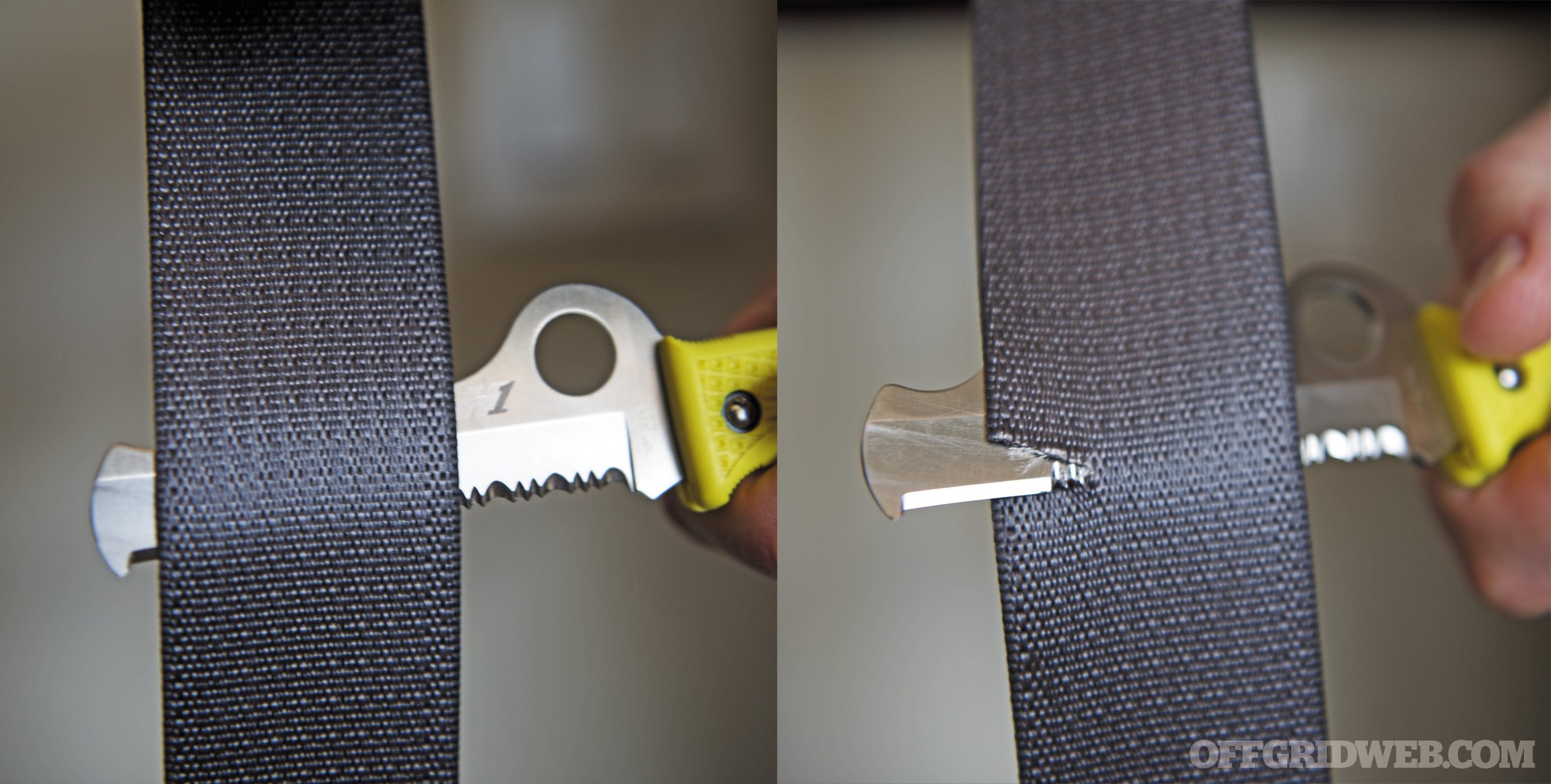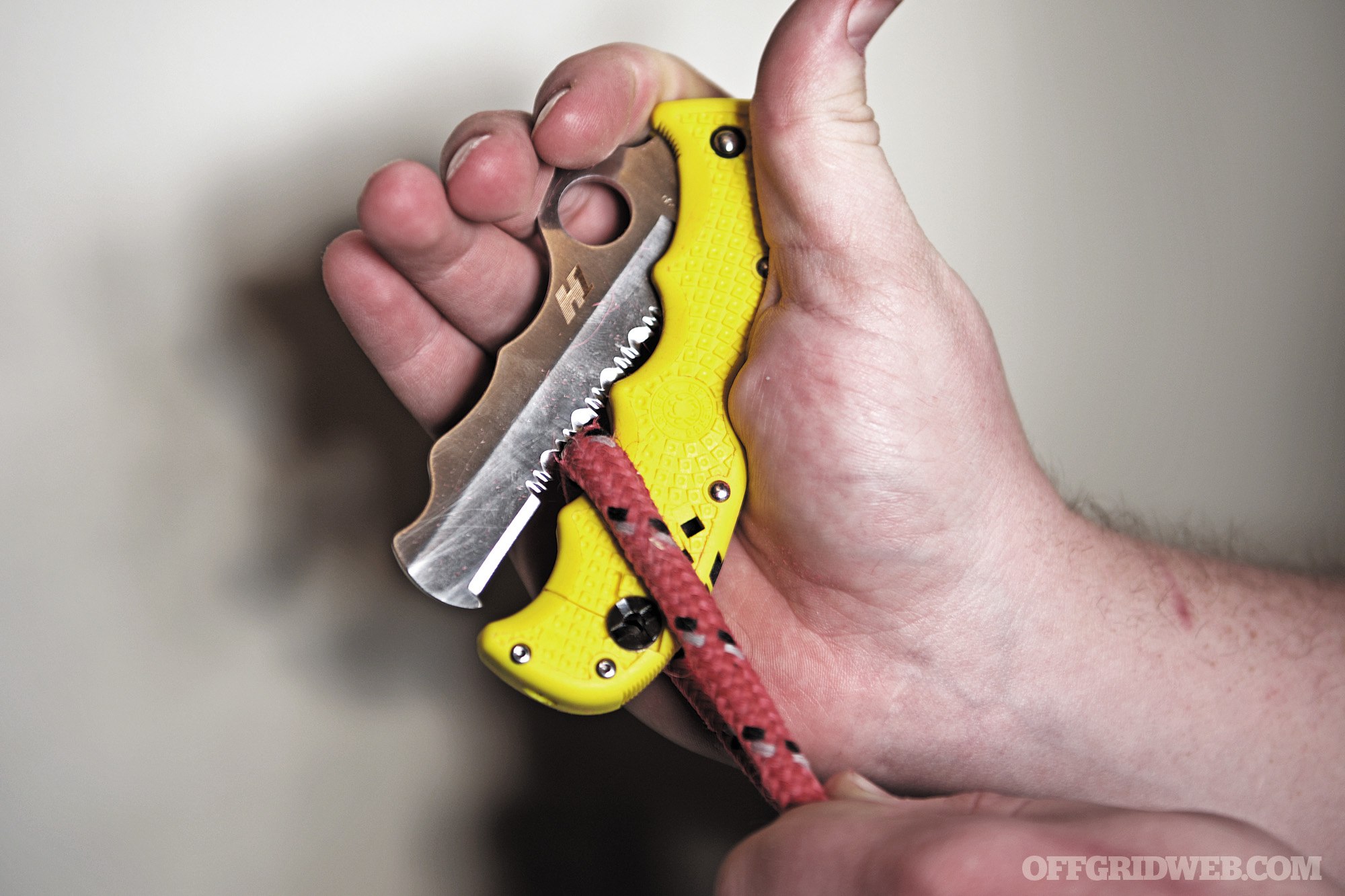RECOIL OFFGRID Gear Review: Spyderco Assist Salt Knife
She’s bloody, upside down, unconscious, and behind a tinted window. Worse, you smell gasoline, and you have no cellphone signal to call 911 and no time to wait for help to arrive. Your choice is simple: extract her from the vehicle or watch the love of your life get barbecued under glass.
But all you have in your fisted and frustrated hands is the latest everyday-carry tactical ninja tanto blade. Nothing about it will help you safely get into the vehicle and extract her from her seatbelt without putting you and her at risk.
Saving your ass, or someone else’s, often comes down to preparing for what’s more likely (a car accident) rather than what’s not (a zombie outbreak). Enter the Spyderco Assist.

Both distinctive and utilitarian, Spyderco knives are a common sight clipped to the pockets of knowledgeable and practical people as EDC folding knives. But in the Assist, Spyderco founder Saul Glesser combined his decades of design experience and the best of modern materials to create an un-rustable, purpose-designed rescue and utility knife suited for both emergency professionals and the prepared of mind.
The “rescue knife” as a class of tools is intended primarily to extricate oneself or another person from a seatbelt or harness system, while also serving as an overall utility blade for the general cutting tasks encountered by first responders. So Saul applied several of the lessons learned from years of EDC knife design and incorporated them into the Assist. The knife’s controls are ambidextrous both in the one-handed opening features as well as the reversible clip that can be oriented for left or right and tip up or down carry.
Folded, the back rocker-locked Assist is 8.43 inches long overall and weighs in at 4 ounces. The knife’s blade has a blunt tip designed to both prevent the puncture of a victim inside a strap as well as function as a safe physical index for the user when the knife has to be positioned by feel while out of sight. The blade’s 3.69 inches is serrated for the majority of its length, but has a 7/8-inch chisel-ground, plain-edge section just before the tip for initiating strap cuts.
In its 5-inch folded configuration, the Assist hides two unique features. First, a squeeze of the finger-choiled blade into the handle exposes a carbide-tipped glass-breaker embedded in the pommel. This gives the user the ability to break windows in a rescue situation without carrying an exposed, sharp-tipped tool in an outside pocket. This tip is replaceable if you somehow manage to dull the carbide. Additionally, Spyderco designed a hesitation notch at the 45-degree blade-to-handle position. This notch allows the user to easily stop the blade in a partially open position and use it in concert with the handle in a scissor technique.

The “rescue knife” as a class of tools is intended primarily to extricate oneself or another person from a seatbelt...
Thick rope gets chopped like celery, where thinner cordage (such as parachute cord) should be held taut across the handle for a crisp cut. The feature gives the user an option to cut line, straps, or hoses without a sawing motion or worrying the blade might cut the victim or rescuer as the material is severed. This function takes a bit of practice, but once quickly mastered, the technique allows for a faster and safer approach to many cutting tasks. The Assist also contains a small but loud whistle cut into the contour of the handle that the user can utilize for self-rescue.

Thick rope gets chopped like celery, where thinner cordage (such as parachute cord) should be held taut across the...
Spyderco initially introduced the Assist with a black handle and coated VG-10 blade. But the popularity of the design and the appearance of its rustproof H1 steel in other designs demanded a marriage. Now the Assist can be found with Spyderdco’s bright rescue yellow fiber-reinforced nylon (FRN) handles and the H1 steel.
First introduced in its line of dive knives, the H1 steel is made with nitrogen rather than carbon. Without carbon, the steel is physically incapable of rusting. H1 is also an austenitic steel, which “work hardens” as the edge and serrations are ground, allowing for precise hardening of the cutting edges while leaving the thicker spine more flexible. And — though anathema as a formal test to most knife-makers, but infinitely practical to most end-users — the Assist gets an A+ as a box cutter. The curved tip and plain-edge section make for excellent controlled-depth cuts across tape and cardboard.
Ultimately, the Spyderco Assist Salt is a viable EDC for the emergency professional, but for the average person, it’s the knife you should have clipped to your vehicle’s sunvisor, tucked in the console, or at least within arm’s reach of the driver seat. Whether for self-rescue or to provide assistance to someone else, having the Assist in your vehicle will enable you to get through glass, seatbelts, and, if necessary, clothing to remove a victim in an extreme situation or when time or professional help is not available.
Will the Assist help you fight ninjas, zombies, or terrorists? Not likely — but in addition to its purpose-designed rescue features, it’ll do a very clean job of opening your latest Amazon Prime delivery without puncturing the contents.
Weight
3.9 Ounces
Overall Length
8.38 inches
Blade Length
3.69 inches
Blade Steel
H1
MSRP
$160
URL
www.spyderco.com
Don’t miss essential survival insights—sign up for Recoil Offgrid's free newsletter today.
Read articles from the next issue of Recoil Offgrid: Issue 14
Read articles from the previous issue of Recoil Offgrid: Issue 12
Editor's Note: This article has been modified from its original print version for the web.
 STAY SAFE: Download a Free copy of the OFFGRID Outbreak Issue
STAY SAFE: Download a Free copy of the OFFGRID Outbreak Issue
No Comments